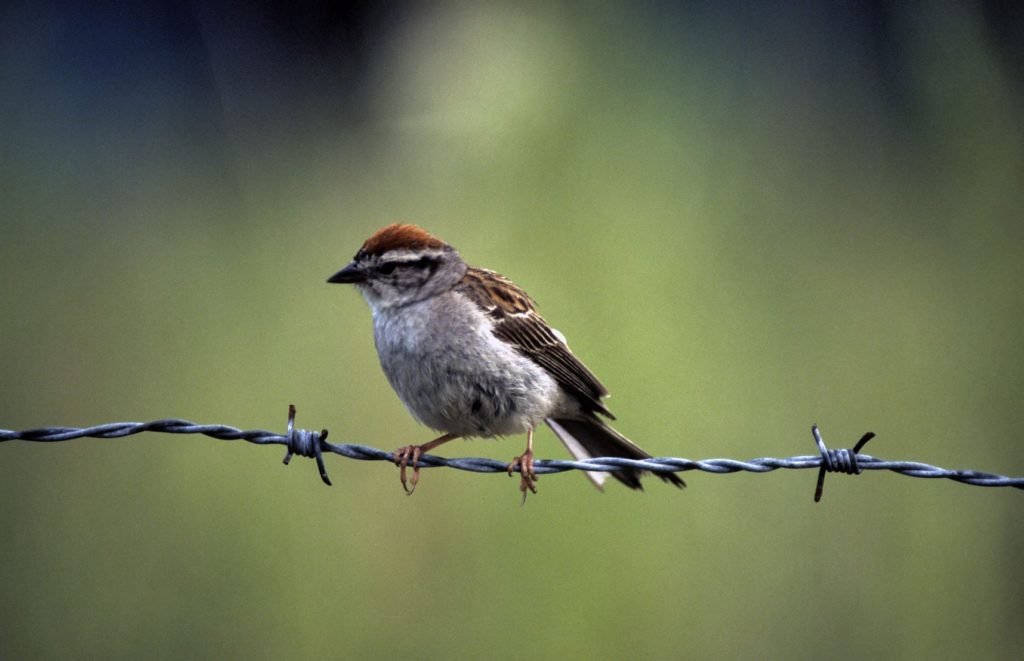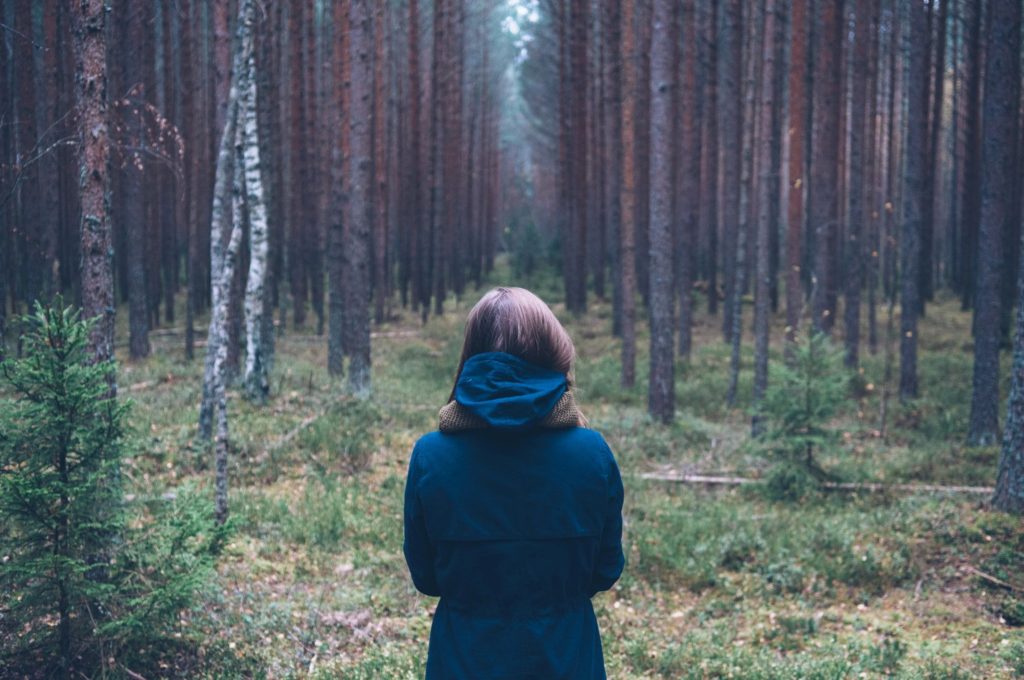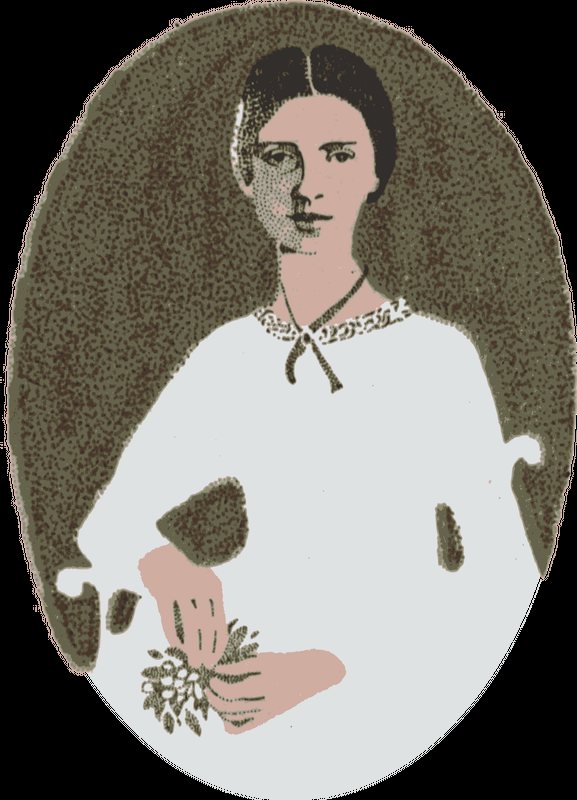On a bright April afternoon in 1976, my mother took me to New York City to see a play called The Belle of Amherst. A one woman show depicting the life of Emily Dickinson. The actress, Julie Harris, acted as fifteen different characters, Emily’s poetry and letters woven deftly into a brilliant show. I had memorized one of her poems in second grade, “I’m nobody who are you?” and carried a slim book of her poetry in my backpack. Emily Dickinson was my JK Rowling.
The play revealed my favorite poet’s experience living in Amherst, often dismayed by life despite her keen mind and wit. When it was over, my ten-year-old heart ached. I wanted Emily’s life to have been full of freedom and joy, to have held requited love, and a large warm family. I had been raised to believe those were the elements a good life.

“Hope is the thing with feathers –
That perches in the soul…”
And yet, her experience of retreat – to be able to hide from the world and perfect her craft – touched off a longing in me.
Whether it was in response to the strong feelings the play evoked, or the pain of separation from my soul-mate Emily, I burst into tears when the curtain came down.
My mother and Aunt, surprised but amused, scooted me out of the theater and settled me down with a hot chocolate in a diner on West 48th street.
My aunt waved off my concern, even then, that I would never nurture that kind of talent. “You can be a lady writing in the woods if you really want to, Joanell. You’ll be a writer when you grow up, wherever you are.”
My career as a writer was somewhat expected at that point. My first poem had been published at six, I had been found to wander the woods at night, determined to find inspiration, and I preferred hwriting in the closet (we had a big noisy family), to playing in the pool with the neighborhood gang.
But my Aunt’s words stirred anxiety, my heart a bird flapping its wings in my chest.
“But I don’t want to just be a writer in the woods.”
“Well you can be anything you want,” my aunt said. We were all confident, in the mid-seventies, that all girls could now be anything.
“What else would you want to be?”
“I’m going to be a psychologist.” Emily Dickinson, I was fairly sure, needed a good psychologist.
Now both women stared, puzzled. I had never been to a therapist or any kind, nor had anyone in our family. Eyebrows were raised. My mother, usually the champion of furthering her children’s accomplishments at all times, hesitated.
“You could be a nurse or even a doctor . . .”
“I want to help sad people. Isn’t that what they do?”
“Yes.”
“I’ll make people like Emily Dickinson feel better.”
By that age I’d already developed a keen empathy for others that would be both my burden and my gift, for the rest of my life. I could sense when a child down the aisle was struggling with a math problem, felt the pain in my mother’s arthritic hands as she helped me tie my shoe laces, and knew my father’s temper was rising before he did.
I had to learn to use this tool, or it would overwhelm me. It hardly felt like a choice. And I already grappled, by ten, with my own bouts of despair, arriving some time in November and lifting finally each April. When Emily wrote of “A certain slant of light, on winter afternoons that oppresses like the weight of cathedral tunes.” I felt sure she was speaking to me.

Fast forward fifteen years. By 1992, I had my Masters in Psychology, was on my way to being a licensed therapist, and was a new mother. But whenever I had a free moment, I wrote. Whether it was journaling, poetry, essays, short stories or letters to the editor, I wrote every day.
My path had taken a few twists between ten and twenty-five. I’d dropped out of high school, bored, and jumped to community college, then transferred to four year. My father had infamously switched my major at Rutgers without my knowledge from psychology to business, and I lost a semester trying to balance equations.
I’d turned down a scholarship to a good law school after college, in order to take a job helping the homeless.
I’d travelled to third world countries, interned at IBM and ATT, protested apartheid for a month on a cold side-walk, taught French to pre-schoolers and archery to inner city campers.
I knew I wanted to make a difference, and while I considered the possibilities of doing so through business, education, and even political office, deep down I’d been called to two vocations. I knew at age ten what would be my impactful path: to counsel others and to write.
I was blessed with that inner knowing, a homing point to return to each time I got “lost in the woods.” In some ways, it is easier to hear the universe calling you when you’re a child.
Emily Dickinson’s words had flowed from the stage to my young mind that day, invoking a life time of service and creativity. Had I been older, I might not have heard her. Had she been less poetic, less urgent in her language, gone unnoticed by her mentors – had someone not taken the time to create this incredible play—had my mother not been the kind of parent who took a ten year old to the theater – who knows? I might be a corporate attorney.
But the stars aligned, the words were spoken from the stage with passion and urgency- and as if this writer herself had stepped through time and taken my hand, I followed.

I robbed the Woods—
The trusting Woods.
The unsuspecting Trees
Brought out their Burs and mosses
My fantasy to please.
I scanned their trinkets curious—I grasped—I bore away—
What will the solemn Hemlock—
What will the Oak tree say?
Emily Dickinson
